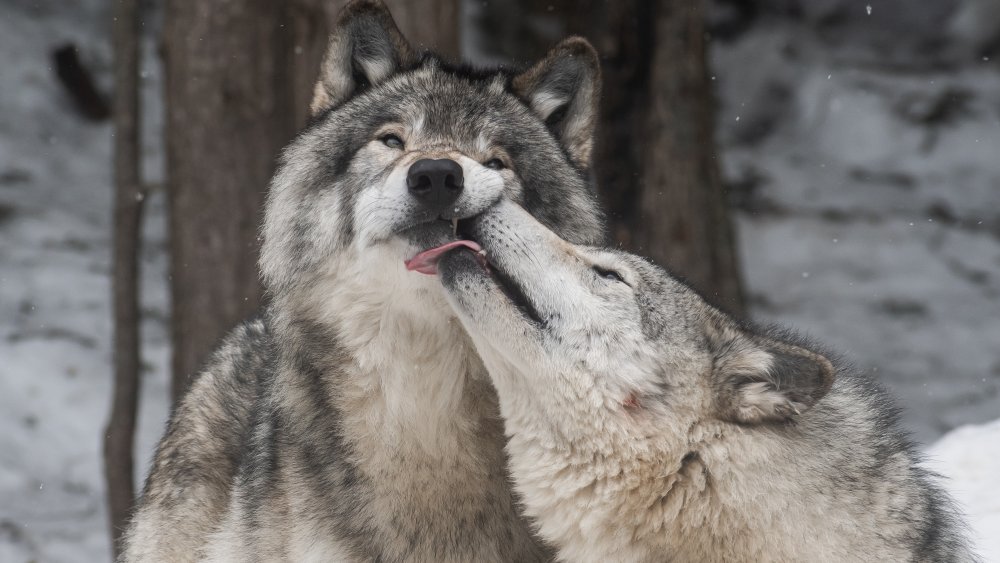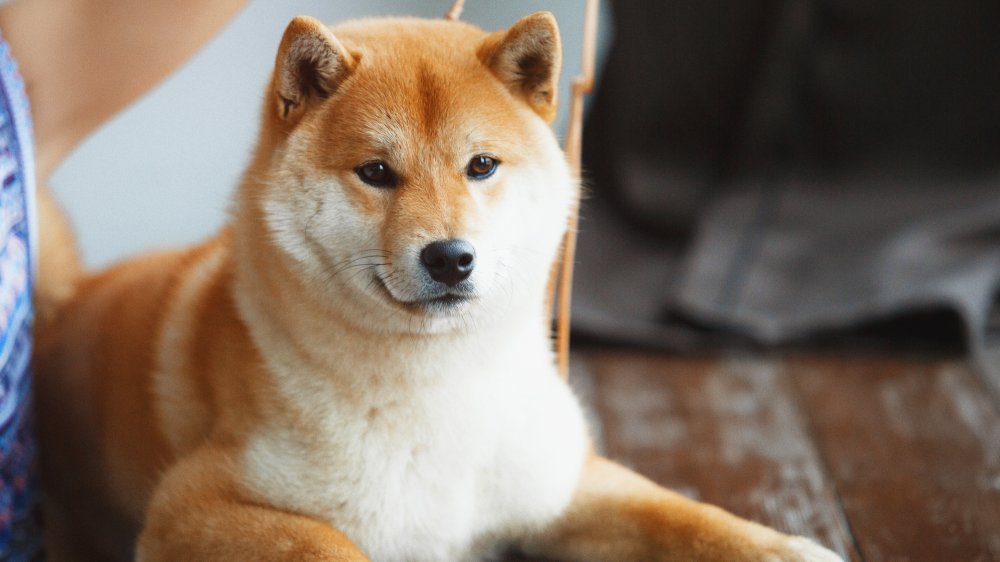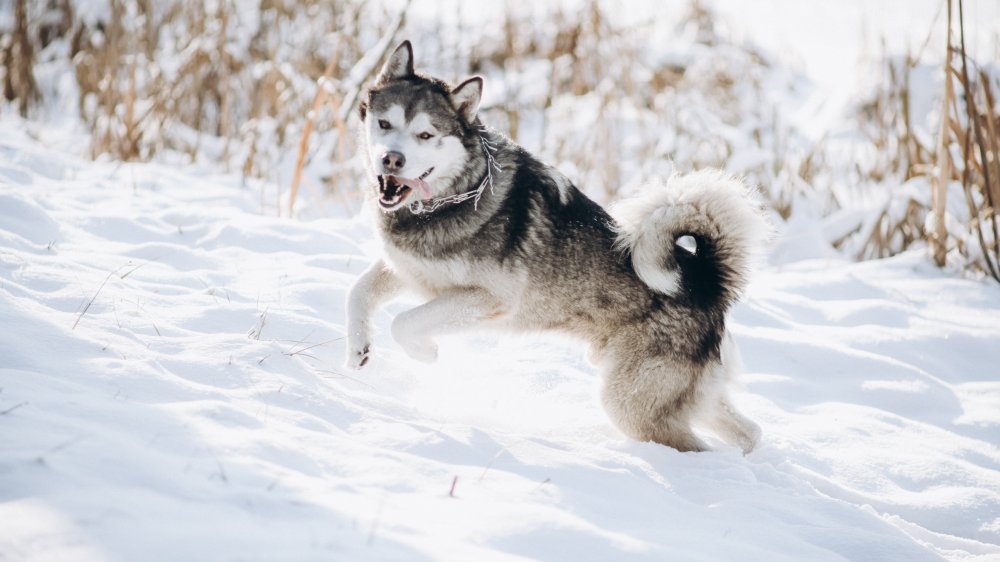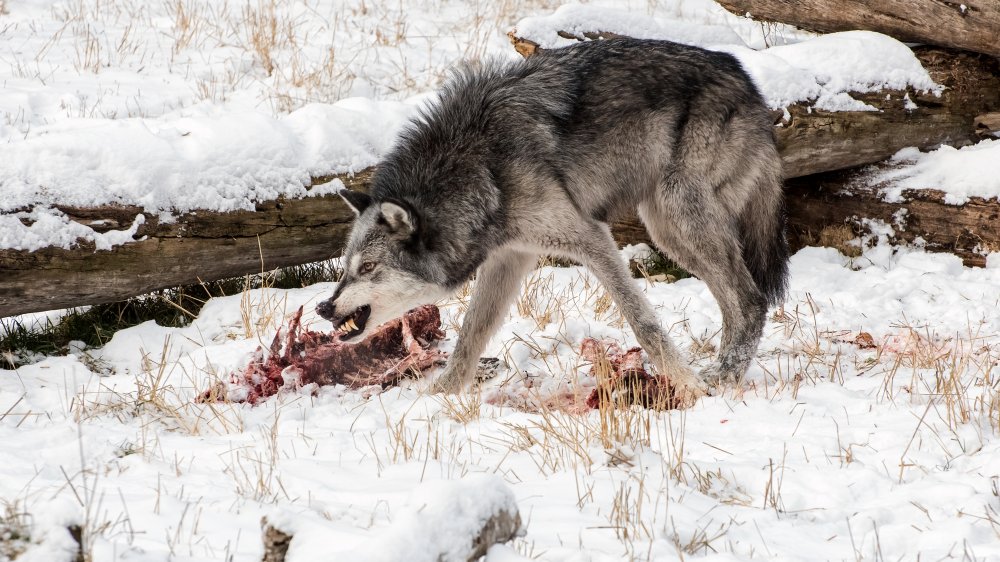The Dog Breed That Is Closest To A Wolf
People have adopted all kinds of animal friends throughout history, but dogs have always been humankind's closest companions. PBS writes that it was an astonishing 130,000 years ago that humans and gray wolves first got cuddly, and while the exact origins of this mutually beneficial relationship are mysterious — it's often been speculated, as National Geographic points out, that it was actually the canines who domesticated the humans, rather than the other way around — the one thing that can't be debated is that these two strikingly different species have been buddy-buddy ever since.
That said, today's dogs are dramatically different animals than the wolves they evolved from. Seriously, how long did it take for such fearsome creatures to start adorably tilting their heads, much less transform into tiny dog breeds such as pugs and chihuahuas? Yikes. As if that wasn't crazy enough, the contemporary doggo that is the most genetically similar to its ancestors is about the least wolfy little thing imaginable.
The dog most genetically similar to its wolfy ancestors is ... not quite what you'd expect
Hold your breath, dog lovers. Back in 2012, as explained by The Nest, a collaborative DNA study called CanMap was conducted by UCLA, the National Institutes of Health, and Cornell University on 85 different dog breeds, using 1,000 individual dogs. While the results of this study were fascinating in many ways, perhaps the most amusing discovery was that the canine which had the most in common with its ol' gray wolf grandpa, bizarrely enough, was a Shiba Inu. Yes, that's the same cute little orange fella made famous by the Doge internet meme, with its stout body and curlicue tail. Other breeds that came out as very genetically similar to their wolf ancestors were the ever-fluffy chow chow, the Akita, and the Alaskan malamute.
Surprising as these results may be, they're also easy to misread: just because Shibas and chow chows are genetically more similar to gray wolves doesn't mean that they're particularly "wolfy" when it comes to their behavior, social tendencies, and so on.
Wait, so which dogs ACT the most wolfy?
As far as looks and behavior go, K9 of Mine points out that some of the more wolf-like dogs are Kugshas, Utonagans, Siberian huskies, and the aforementioned Alaskan malamutes, all of which could easily be mistaken for a wolf if you saw one running through the snow ... you know, tongue wagging aside. Those snow-loving Alaskan malamutes, in particular, are known for preferring to run in packs, according to the American Kennel Club. This group behavior, which is about as wolfy as it gets, stands in contrast to more solitary and aloof dogs like Shibas: keep in mind, despite that silly "lone wolf" expression that antisocial humans love to describe themselves with, real wolves are anything but loners.
Now, to be fair, trying to figure out whether a husky or a malamute looks or acts more like a wolf is splitting hairs. However, if you want to count points for DNA in one column, points for sheer wolfiness in another, and add them together, you could make a solid argument that Alaskan malamutes are, thus, the most wolf-like dogs. Though, to be clear, they're certainly a great deal friendlier with humans — and goofier — than regular wolves.
Wait, so what about straight-out domestic wolves or wolfdogs?
If there's one thing that all these wolfy studies and wolfy debates prove, it's that people really love the idea of having the wolfiest dog imaginable. So, then, if people really want a wolfy dog, why not just get a domestic wolf, and raise it as a dog?
Well, here's the thing. Similar as they may be, dogs and wolves aren't the same, and frankly, you probably don't want a real wolf as a pet. Again, keep in mind that dogs have evolved alongside humans for thousands upon thousands of years, so even if you were to adopt a wolf as a puppy and raise it like a dog, it would exhibit different natural behaviors once it comes of age. As One Green Planet points out, wolves and wolfdog hybrids (i.e., the child of a wolf and, say, a malamute) probably won't have the instinctive desire to please you, much less snuggle on the couch, as opposed to hunting out rabbits and killing them. That's not to say that wolves are mean or vicious. They aren't. But they do communicate differently with dogs, and this can create problems when it comes to human interaction. For instance, according to Gray Wolf Conservation, wolves often greet one another by "hugging" with their mouths: that's fine if you're a wolf, but if you're a human, you might not enjoy your pet wolf "biting" your face. Also, wolves and wolfdogs aren't easily managed or trained, as explained by Kim Miles, VP of the wolfdog advocacy group the Florida Lupine Association. As she puts it, "A dog is like a 12-year-old child, and a wolf is like a 35-year-old man. The dog will generally do what you want it to, but the wolf will do what you want only if he wants to do it himself." Oof.
Another problem? There are no approved rabies vaccines for wolves or wolfdogs. Not good. So if you want a wolfy-looking dog, get an Alaskan malamute (and make sure you've got a big yard for it to run!), but please let real wolves stay wolves.



